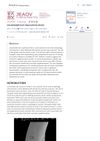2 citations,
January 2014 in “Indian dermatology online journal” A person was born with both a rare hairless condition and a type of birthmark, which is an uncommon combination.
 December 2023 in “Clinical Cosmetic and Investigational Dermatology”
December 2023 in “Clinical Cosmetic and Investigational Dermatology” An 8-year-old Saudi boy was diagnosed with a rare genetic disorder causing hair loss, skin issues, and light sensitivity.
 February 2023 in “JEADV Clinical Practice”
February 2023 in “JEADV Clinical Practice” Biotin supplements significantly improved a young girl's uncombable hair.
January 2022 in “Springer eBooks” Combining PRP with lipofilling shows promise for tissue regeneration but needs more clinical trials to confirm benefits.
November 2021 in “CRC Press eBooks” Hair shaft disorders cause fragile, brittle, and abnormal-looking hair.
Controlling Tslp can improve health in AEC syndrome patients.
 April 2012 in “Encyclopedia of Life Sciences”
April 2012 in “Encyclopedia of Life Sciences” Different genes are linked to various types of hair loss.
119 citations,
November 2016 in “American journal of human genetics” Mutations in three genes cause Uncombable Hair Syndrome, leading to frizzy hair that can't be combed flat.
86 citations,
January 1996 in “Clinics in dermatology” Hair can be damaged by daily routines, but protein-based products can protect and improve it.
 58 citations,
January 2015 in “International Journal of Trichology”
58 citations,
January 2015 in “International Journal of Trichology” Platelet-rich plasma, which carries growth factors, could be a promising treatment for non-scarring hair loss, promoting hair growth and density with no major side effects.
53 citations,
January 2013 in “Journal of toxicologic pathology” The project created a standardized system for classifying skin lesions in lab rats and mice.
44 citations,
April 2013 in “Proceedings of the National Academy of Sciences of the United States of America” FGF13 gene changes cause excessive hair growth in a rare condition.
26 citations,
December 2013 in “Seminars in cell & developmental biology” Skin varies in thickness, color, and features due to complex genetic and cellular processes.
24 citations,
June 1999 in “Mechanisms of Development” Ornithine decarboxylase is crucial for hair growth and follicle development.
22 citations,
April 2022 in “Stem cell research & therapy” Hair follicle-derived extracellular vesicles may help heal chronic wounds as effectively as those from adipose tissue.
20 citations,
April 2000 in “Experimental dermatology” ODC transgenic mice can model human hair loss with skin lesions.
 19 citations,
January 2015 in “Journal of Clinical and Diagnostic Research”
19 citations,
January 2015 in “Journal of Clinical and Diagnostic Research” The main causes of diffuse hair loss in women are telogen effluvium and androgenetic alopecia, often related to stress and iron deficiency.
 15 citations,
June 2019 in “Experimental Dermatology”
15 citations,
June 2019 in “Experimental Dermatology” Old neuropharmacological drugs might be effective for treating inflammatory skin diseases.
13 citations,
January 2018 in “International Journal of Trichology” Intralesional triamcinolone injections can effectively stop frontal fibrosing alopecia with minimal side effects.
13 citations,
August 2005 in “Journal of Investigative Dermatology Symposium Proceedings” Mutations in the DSG4 gene cause fragile, sparse hair in humans, mice, and rats.
10 citations,
November 2013 in “African Journal of Traditional Complementary and Alternative Medicines” Herbal oils from Cuscuta reflexa help with hair growth, dandruff, and hair fall.
9 citations,
March 2009 in “The journal of investigative dermatology/Journal of investigative dermatology” Ectodysplasin signaling is crucial for skin appendage development, requiring specific doses and durations.
 8 citations,
April 2022 in “The journal of investigative dermatology/Journal of investigative dermatology”
8 citations,
April 2022 in “The journal of investigative dermatology/Journal of investigative dermatology” Certain genetic changes in the LSS gene cause a rare skin and hair condition.
 7 citations,
September 2017 in “Biomedical and Pharmacology Journal”
7 citations,
September 2017 in “Biomedical and Pharmacology Journal” Growth factors greatly affect hair loss, with different levels seen in men, women, younger patients, and at the start of the condition.
5 citations,
November 2013 in “Journal of Investigative Dermatology” The glucocorticoid receptor helps protect skin from tumors and other issues.
 4 citations,
January 2018 in “International Journal of Trichology”
4 citations,
January 2018 in “International Journal of Trichology” A rare genetic disease causes sparse hair and early blindness due to a gene mutation.
3 citations,
August 2018 in “Medical Journal Armed Forces India/MJAFI” Intense Pulse Light effectively reduces hair growth in faun tail nevus.
2 citations,
July 2021 in “Genes” A specific genetic change in the KRT71 gene causes a hair loss condition in Hereford cattle.
2 citations,
September 2017 in “Biotechniques/BioTechniques” Researchers created a mouse cell line to study hair growth and test hair growth drugs.
2 citations,
June 2017 in “The journal of investigative dermatology/Journal of investigative dermatology” Epigenetic factors play a crucial role in skin health and disease.








